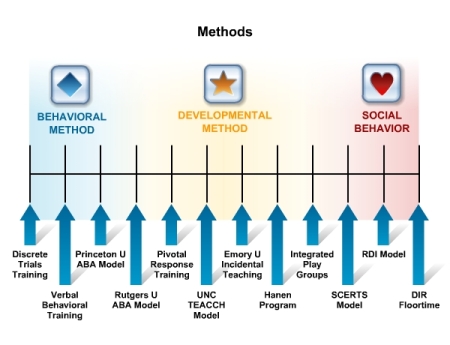Evidence Based Information
It can be so very difficult to determine what treatments are effective for autistic people and which are not. You may hear from a mother in a support group, for instance, that they tried ____ treatment with their child and it helped them. But how do you know if that treatment is actually likely to help your child? If you don't have a background in research and science, all you can do is guess, and maybe consult Google. But Google is more likely to pull up blogs and testimonials than actual scientific evidence (unless, of course, you're using Google Scholar, which you totally should), and you still would have no way of truly knowing if a treatment is likely to help you or your child until you try it. Considering that can be expensive, time consuming, and occasionally downright dangerous, "try everything" is not really a good option.
I am not an autism professional, and my personal advice about these therapies and treatments is not valuable. However, what I can do and have done is link to some of the most reputable sources of evidence in the world. I put up links to some of the most well-known therapies, both mainstream and alternative, and medications, as reviewed from the American Speech and Hearing Association (a highly reputable association which guides American speech pathologists and audiologists) and the Cochrane Review database (which is pretty much the gold standard of medical reviews). These do not necessarily present my own personal views; they present the evidence that science has to offer. With that said, click on any treatment name to learn more.
I am not an autism professional, and my personal advice about these therapies and treatments is not valuable. However, what I can do and have done is link to some of the most reputable sources of evidence in the world. I put up links to some of the most well-known therapies, both mainstream and alternative, and medications, as reviewed from the American Speech and Hearing Association (a highly reputable association which guides American speech pathologists and audiologists) and the Cochrane Review database (which is pretty much the gold standard of medical reviews). These do not necessarily present my own personal views; they present the evidence that science has to offer. With that said, click on any treatment name to learn more.
Therapies
PARTIAL List of Therapies found to be effectiveBehavioral Interventions (such as ABA)
Cognitive Behavioral Therapy (CBT) Denver Model Early Intensive Behavioral Intervention LEAP Milieu Teaching Music Therapy Parent-Delivered Early Intervention Peer Mediated Intervention Pivotal Response Training (PRT) Positive Behavior Support Social Skills Groups Social Stories TEACCH Video Modeling For more interventions, visit ASHA's Evidence Maps Therapies Not Fully Supported By EvidenceTherapies Found to Be Ineffective |
Comparison StudiesTitles are HIGHLY oversimplified
|
Communication Methods
Augmentative and Alternative Communication (AAC)
Facilitated Communication
Picture Exchange Communication System (PECS)
Sign Language
Facilitated Communication
Picture Exchange Communication System (PECS)
Sign Language
Medications
Supplements
Diets
Other Treatments
Read More:
Though they are not article reviews, the Autism Science Foundation has a good page of non-evidence based treatments for autism, most of which are treatments that can prove harmful, or even deadly. To read their list and be warned as to which treatments are not evidence based, click here.

